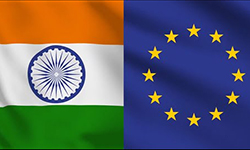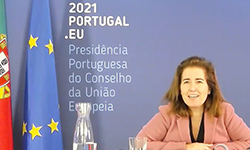BusinessEurope Headlines No. 2021-04
European business exchanges views with the Prime Minister of Ukraine

On 10 February 2021 a high-level meeting took place virtually between the Prime Minister of Ukraine Denys Shmyhal and representatives of the European business community. "BusinessEurope and the broader European business community appreciates the frank and comprehensive discussion that we held with the Prime Minister on the occasion of his visit to Brussels", said Markus J. Beyrer, Director General of BusinessEurope. "The EU and Ukraine are important trading partners and we consider that the bilateral Association Agreement, which contains a Deep and Comprehensive Free Trade Area (DCFTA), provides the right framework to help our political and economic relations to further and thrive". BusinessEurope advocates for and supports the efforts of the Ukrainian authorities towards the necessary reforms that will help Ukraine's economy to modernise and diversify.
Contact: Sofia Bournou
Our comment:
The EU-India Partnership: Follow-up, Focus, and Free Trade
By Maurice Fermont, Senior Adviser, International Relations
 This article was first published at the German Marshall Fund Agenda 2021 series.
This article was first published at the German Marshall Fund Agenda 2021 series.
For almost seven years the EU and India have searched for ways to revive their partnership. After a successful summit in July 2020, progress may finally be on the horizon. The pieces have been there for a long time: shared values, commitment to rules-based multilateralism, and mutual economic opportunities. What has been lacking is a clear understanding of how to put these together to form a coherent picture, and thereby putting ambition into practice. Can the two sides finally see the bigger picture in 2021?
The outcomes of last year's summit present a real window of opportunity. The creation of a High-Level Dialogue on Trade at ministerial level has been a longstanding European task to achieve greater coordination and inject political guidance into an at times fraught economic relationship. After years of limited enthusiasm, it seems like India has moved the EU up on its priority list. The EU is its largest trading partner (with 11.1 percent of its total trade in 2019, worth around €80 billion) and its top foreign investor (making up 18 percent of inflows that same year).
Still, there are key challenges to overcome in order to develop the strategic partnership in earnest: follow-up, focus, and free trade. There is hope that political guidance from India’s government will help circumvent bureaucratic obstacles hindering closer cooperation with the EU. But the key question for this year is whether India will be able to remain focused on the EU in the busy arena of international diplomacy. It will require more than economic potential to make that happen. And this also depends in part on the extent to which the EU can maintain its relevance for India as a valuable partner. The trend here looks positive. Geopolitical developments in recent years have driven member states closer together and enabled the EU to act more strategically in several policy areas, including its India policy. Another challenge is about India’s economic openness. The mixed messaging from the country in recent years, such as the launch of the Make in India campaign aimed at attracting greater investment, paired with the sudden cancellation of all its bilateral investment treaties with European partners, has sent protectionist signals and begs the question whether the government is truly committed to creating an enabling business environment for trade and investment.
Nevertheless, the economic fallout of the coronavirus pandemic perhaps provides a greater impetus to bringing the EU and India together than any policy dialogue could ever have achieved. India’s economy has been particularly affected, with the IMF estimating that it has shrunk by just over 10 percent in 2020, more than any other large economy. Trade and investment will likely play an important part in the global economic recovery. Rather than leading to de-globalisation, the economic impact of the pandemic has driven European firms toward diversification in their search for greater supply-chain resilience. India wants to benefit from this supply-chain restructuring and attract these firms, creating new opportunities for cooperation with the EU.
Although negotiations on the free trade agreement have stalled since 2013, it remains an important vehicle to enable economic gains. Some commentators argue that the EU should abandon its focus on a comprehensive agreement with India and seek instead partial ones in areas of strategic importance. The two are not mutually exclusive, however. A free-trade agreement, while comprehensive, would not cover everything and cooperation in strategic areas like technology or connectivity would likely be facilitated through separate agreements. At the same time, the economic potential of a free trade agreement between the EU and India remains huge, with pre-coronavirus estimates indicating a resulting annual GDP increase for India of 1.3 percent. There is no alternative that can achieve similar results. Continue reading the full article at GMF
Markus J. Beyrer discusses with Labour Minister Ana Mendes Godinho Portuguese Presidency priorities in social affairs
 The Portuguese Presidency of the Council of the EU has a central role to ensure a successful recovery from the COVID-19 crisis, in close cooperation with the EU and national social partners. We are not yet out of the woods. In the short-term, the Portuguese Presidency must put the issue of active labour market policies high on the agenda, particularly as we expect unemployment to increase significantly in 2021. Employment should be at core of EU and national efforts to recover from the COVID-19 crisis. Skills investments are also important, combined with the forceful implementation of the necessary structural reforms, to improve productivity across Europe. This is the best way to provide the basis for economic growth, job creation and adequate social protection in the long-term. The Portuguese Presidency also has an important role to fairly reflect the diverse views of Member States on minimum wages so that national competences and social partner autonomy are better respected than in the European Commission’s proposal. These were the key messages of BusinessEurope Director General Markus J. Beyrer.
The Portuguese Presidency of the Council of the EU has a central role to ensure a successful recovery from the COVID-19 crisis, in close cooperation with the EU and national social partners. We are not yet out of the woods. In the short-term, the Portuguese Presidency must put the issue of active labour market policies high on the agenda, particularly as we expect unemployment to increase significantly in 2021. Employment should be at core of EU and national efforts to recover from the COVID-19 crisis. Skills investments are also important, combined with the forceful implementation of the necessary structural reforms, to improve productivity across Europe. This is the best way to provide the basis for economic growth, job creation and adequate social protection in the long-term. The Portuguese Presidency also has an important role to fairly reflect the diverse views of Member States on minimum wages so that national competences and social partner autonomy are better respected than in the European Commission’s proposal. These were the key messages of BusinessEurope Director General Markus J. Beyrer.
Contact: Maxime Cerutti
New position paper on EU ETS reform: ambition, innovation and protection
 "More than ever, this revision needs to strike the right balance between driving ambition, supporting innovation and ensuring competitiveness", states BusinessEurope's new position paper on the upcoming EU ETS reform. The paper puts forward a first input to the ongoing consultation and sets the key principles that all together define our vision for the reform. It also provides our initial views on possible design changes to ensure effective implementation of these principles. "The EU ETS should remain the main driver for the European industry to reduce greenhouse gas emissions in a market-based and cost-effective manner while maintaining our competitiveness on a global scale".
"More than ever, this revision needs to strike the right balance between driving ambition, supporting innovation and ensuring competitiveness", states BusinessEurope's new position paper on the upcoming EU ETS reform. The paper puts forward a first input to the ongoing consultation and sets the key principles that all together define our vision for the reform. It also provides our initial views on possible design changes to ensure effective implementation of these principles. "The EU ETS should remain the main driver for the European industry to reduce greenhouse gas emissions in a market-based and cost-effective manner while maintaining our competitiveness on a global scale".
![]() Contact: Alexandre Affre
Contact: Alexandre Affre
Hoping to end a streak of missed opportunities on services
 The European business community does not lose hope that the Single Market for services will be improved. After a difficult political debate on the "2017 Services Package" ended in a failure to adopt the new set of rules, except for the Directive on a Proportionality Test before Adoption of New Regulation of Professions, all the attention again shifted to non-legislative means to improve the functioning of cross-border provision of services. There seems to be a broad agreement that the main focus should be on better implementation of the Services Directive, the central piece of EU law on the Single Market for services. Interestingly, on top of calls by politicians and stakeholders on the European Commission to keep a close eye on the implementation of the Services Directive, the latter also puts a legal obligation for the Commission to table 'a comprehensive report on the application of this Directive' every three years, starting 28 December 2011. Therefore, a regular report on how successful Europe is in applying the Services Directive was due on 28 December 2020. Somehow, the deadline was missed and there were no signs of the report being 'in the pipeline', leaving us wonder how that Commission’s legal obligation on the analysis of evidence got lost. BusinessEurope, in a joint letter together with its partners EUROCHAMBRES and Eurocommerce, take this opportunity to remind the Commission of its legal obligation to deliver such a comprehensive analysis, which would provide the Commission with an excellent opportunity to give new impetus to the implementation of the Services Directive.
The European business community does not lose hope that the Single Market for services will be improved. After a difficult political debate on the "2017 Services Package" ended in a failure to adopt the new set of rules, except for the Directive on a Proportionality Test before Adoption of New Regulation of Professions, all the attention again shifted to non-legislative means to improve the functioning of cross-border provision of services. There seems to be a broad agreement that the main focus should be on better implementation of the Services Directive, the central piece of EU law on the Single Market for services. Interestingly, on top of calls by politicians and stakeholders on the European Commission to keep a close eye on the implementation of the Services Directive, the latter also puts a legal obligation for the Commission to table 'a comprehensive report on the application of this Directive' every three years, starting 28 December 2011. Therefore, a regular report on how successful Europe is in applying the Services Directive was due on 28 December 2020. Somehow, the deadline was missed and there were no signs of the report being 'in the pipeline', leaving us wonder how that Commission’s legal obligation on the analysis of evidence got lost. BusinessEurope, in a joint letter together with its partners EUROCHAMBRES and Eurocommerce, take this opportunity to remind the Commission of its legal obligation to deliver such a comprehensive analysis, which would provide the Commission with an excellent opportunity to give new impetus to the implementation of the Services Directive.
![]() Contact: Martynas Barysas
Contact: Martynas Barysas
Relief measures offered by financial institutions in the context of COVID-19
 BusinessEurope participated in a round table video conference with EU stakeholders on 5 February to evaluate the best practices to be applied by banks, non-bank lenders and insurers in relation to relief measures offered to consumers and business in the context of the COVID-19 crisis. The round table was chaired by the European Commissioner for financial services, financial stability and Capital Markets Union, Mairead McGuinness, and brought together representatives from EU consumer and business organisations and the financial sector. Last year, the Commission organised two round tables to agree the best practices related to the relief measures, and financial institutions were encouraged to follow these best practices on a best-effort basis. Overall, the best practices and relief measures have helped companies during the different lockdowns and any premature unwinding of relief measures should be avoided.
BusinessEurope participated in a round table video conference with EU stakeholders on 5 February to evaluate the best practices to be applied by banks, non-bank lenders and insurers in relation to relief measures offered to consumers and business in the context of the COVID-19 crisis. The round table was chaired by the European Commissioner for financial services, financial stability and Capital Markets Union, Mairead McGuinness, and brought together representatives from EU consumer and business organisations and the financial sector. Last year, the Commission organised two round tables to agree the best practices related to the relief measures, and financial institutions were encouraged to follow these best practices on a best-effort basis. Overall, the best practices and relief measures have helped companies during the different lockdowns and any premature unwinding of relief measures should be avoided.
Contact: Erik Berggren
Discussion on tax developments with the European Commission
 The latest OECD proposals for global corporate tax reform are ambitious and significant, and we urge all parties to cooperate with a view to an agreement by summer 2021. This was the key message of BusinessEurope’s Tax Policy Group when it welcomed Benjamin Angel, Director of Direct Tax at the European Commission's Directorate-General for Taxation and Customs (TAXUD), to the meeting on 10 February. During this meeting, the group discussed with Angel the ongoing tax developments in the EU, such as the upcoming proposal for an EU digital levy, as well as wider tax measures to support the economic recovery.
The latest OECD proposals for global corporate tax reform are ambitious and significant, and we urge all parties to cooperate with a view to an agreement by summer 2021. This was the key message of BusinessEurope’s Tax Policy Group when it welcomed Benjamin Angel, Director of Direct Tax at the European Commission's Directorate-General for Taxation and Customs (TAXUD), to the meeting on 10 February. During this meeting, the group discussed with Angel the ongoing tax developments in the EU, such as the upcoming proposal for an EU digital levy, as well as wider tax measures to support the economic recovery.
Contact: Pieter Bart
Calendar 
- 23-26 February: EU Industry Days 2021
- 25-26 February: European Council video conference on COVID-19 and security & defence
- 1-5 March: Civil Society Days 2021
Not yet a subscriber? Register here.
Reminder: please have a look at our privacy policy